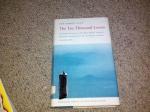|
This section contains 1,433 words (approx. 5 pages at 300 words per page) |

|
SOURCE: Wright, Harold. Introduction to Ten Thousand Leaves: Love Poems from the ‘Manyōshū,’ translated by Harold Wright, pp. 7-11. Boulder, Colo.: Shambhala Publications, 1979.
In the following excerpt, Wright considers love themes in the context of seventh- and eighth-century Japanese poetry.
The Manyōshū “needs no apologies,” Donald Keene writes in the introduction to his Anthology of Japanese Literature. “It is one of the world's great collections of poetry.”1 The title of this outstanding work, Manyōshū, translates literally as “A Collection of Ten Thousand Leaves,” but through implication Manyōshū can also mean “A Collection for Myriad Ages.” Compiled in its final form during the eighth century, the anthology contains 4,516 poems arranged in twenty volumes. Embodying strength of feeling, sincerity, and simplicity, these poems have been honored as the purest expression of the early Japanese spirit.
Much of the Manyōshū's richness is derived from the...
|
This section contains 1,433 words (approx. 5 pages at 300 words per page) |

|


